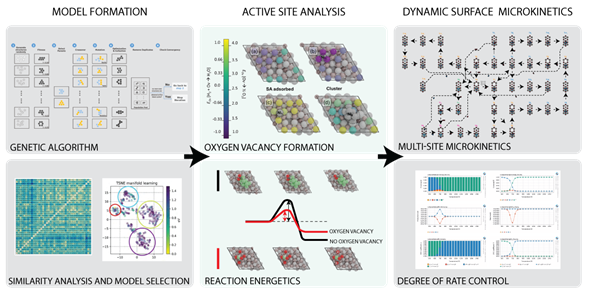Title: Multiscale modelling of the nanoparticle-support interfacial perimeter in heterogeneous catalysis
Speaker: Ivo Filot (TU/e, Inorganic Materials & Catalysis group )
Time: Oct. 13, 2022, 10:00–11:00
Location: TU/e Flux 3.265 and online (MS Teams)
Metallic nanoparticles stabilized on an inorganic support are the most common class of heterogeneous catalysts. The role of the support is much broader than just to stabilize and disperse the catalyst nanoparticles. The support material can modulate the nanoparticle surface morphology and induces formation of active sites. On an atomistic level, the support affects the electronic structure of the active sites involved in the chemical transformation or even hosts unique active sites by itself offering alternative reaction pathways. An ability to tune the interfacial parameter between the support and the nanoparticle is thus an attractive design feature to optimize the catalyst activity and selectivity. Despite numerous efforts, a detailed understanding of the nanoparticle-support interplay is however lacking as nanoparticle/support-interfacial sites are incredibly difficult to characterize due to the limited spatiotemporal resolution of common experimental techniques.
In this presentation, I will show how multiscale computational modelling can be used to describe the complex interplay between the catalyst nanoparticles and their support material. I will explicitly demonstrate this for two important catalytic reactions: the conversion of CO2 to methanol over Ni/In2O3 and the activation of CO over supported Co nanoparticles. Employing modern electronic structure characterization techniques such as Crystal Hamilton Orbital Population analysis, I will explain how a support material can modulate the barriers of elementary reaction steps, which serves as a powerful design feature to optimize existing catalytic materials. Furthermore, I will showcase that non-innocent support materials, e.g. reducible oxides that can form oxygen vacancies, can be involved in synergetic reaction events which lead under the right circumstances to an enhancement of the catalyst selectivity. Using microkinetic simulations and post-simulation sensitivity analysis, we can characterize which elementary reaction steps are most influential to the macroscopically observed catalytic activity. The insights gained offer opportunities to guide the design of novel improved catalyst formulations.

The CCER seminars are aimed at researchers interested in computational approaches to (energy) research. The seminar is small-scale, typically 15 participants, and interactive, offering lots of room for discussion. If you would like to attend, just This email address is being protected from spambots. You need JavaScript enabled to view it. so as to receive the MS Teams meeting link.


